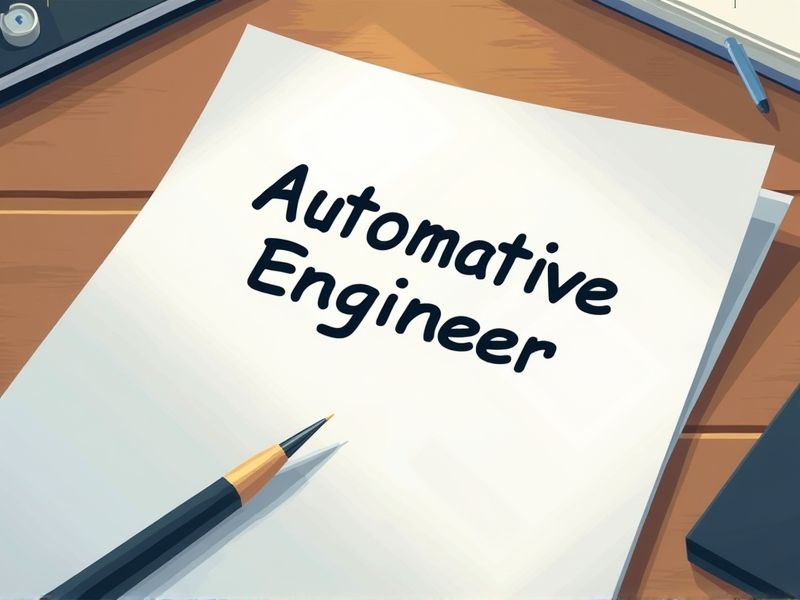
Automotive engineers face complex technical challenges and certifications validate their expertise in navigating these issues. Industry-recognized certifications can enhance an engineer's credibility and improve job prospects, often making them more attractive to employers. Certifications also ensure that engineers are up to date with the latest technological advancements and regulatory standards. Here are some key certifications an automotive engineer might consider acquiring.
Professional Engineer (PE) Certification
Professional Engineer (PE) Certification enhances credibility, showcasing an engineer's adherence to rigorous industry standards and ethical practices. This certification often leads to increased career opportunities, as many employers and states require it for senior positions and responsibilities. It signifies a commitment to continual learning and proficiency, which is crucial in the fast-evolving automotive sector. A PE Certification can also facilitate cross-disciplinary collaboration, as it is widely recognized and respected across various engineering fields.
Certified Quality Engineer (CQE)
Quality standards in the automotive industry are rigorous, necessitating the expertise of a Certified Quality Engineer (CQE) to ensure compliance. A CQE's skills help in developing and maintaining efficient production processes, reducing waste and defects. Their expertise in statistical analysis and quality control can significantly improve product reliability and safety. By implementing quality management systems, CQEs enhance customer satisfaction, which is essential for brand reputation in the competitive automotive market.
Six Sigma Green Belt Certification
Achieving Six Sigma Green Belt Certification equips automotive engineers with skills to systematically identify and mitigate defects, leading to improved vehicle quality. A structured problem-solving approach fosters increased efficiency in production processes, reducing waste and lowering costs. Insight into data-driven decision-making enhances an engineer's capability to optimize design and manufacturing. Certification also increases career opportunities by aligning with industry standards for quality and process improvement.
Project Management Professional (PMP)
Project Management Professional (PMP) certification equips automotive engineers with structured methodologies to effectively manage complex projects, leading to improved project outcomes. It enhances their ability to collaborate cross-functionally, which is essential in the integrated environment of automotive design and manufacturing. Certified engineers are more adept at risk management, minimizing potential delays and cost overruns in automotive projects. PMP also increases the professional credibility of engineers, potentially opening doors to leadership roles within the industry.
ISO 26262 Functional Safety Certification
ISO 26262 Functional Safety Certification is crucial for automotive engineers as it provides a structured framework to ensure vehicle systems function safely under all conditions. The certification helps in identifying and mitigating potential risks, thereby reducing the likelihood of system failures and accidents. Compliance with ISO 26262 is often a prerequisite for entering and competing in global automotive markets, as it aligns with international safety standards. It enhances the engineer's credibility and competence in developing safety-critical automotive systems.
Automotive SPICE Certification
Automotive SPICE Certification enhances an engineer's credibility by validating their understanding of industry-specific process standards, which in turn can improve job prospects due to increasing demands for quality and compliance in automotive software development. Organizations adopting Automotive SPICE standards often see improved project outcomes and risk management, which positions certified engineers as valuable assets in meeting industry benchmarks. Regulatory pressures and consumer expectations for automotive safety and functionality necessitate adherence to established processes, making certified professionals essential for compliance and quality assurance. Being well-versed in Automotive SPICE processes enables engineers to contribute effectively to cross-functional teams, thereby optimizing development cycles and fostering innovation.
Lean Manufacturing Certification
Lean Manufacturing Certification enhances an automotive engineer's ability to identify and eliminate waste, leading to more efficient resource utilization. It equips engineers with skills to streamline production processes, reducing costs and improving product quality. Certification ensures a standardized understanding of lean principles, promoting effective collaboration across teams. In a competitive industry, certified engineers often command higher salaries and are more attractive to employers seeking operational excellence.
CAD/CAM Certification (e.g., SolidWorks or AutoCAD)
A CAD/CAM certification equips an automotive engineer with essential skills in computer-aided design and manufacturing, which streamline vehicle design processes. Mastering tools like SolidWorks or AutoCAD enables engineers to produce detailed blueprints and 3D models, which enhance precision and efficiency in production. The certification demonstrates a professional's proficiency in industry-standard technologies, which many employers value, potentially leading to better job prospects and advancement opportunities. Additionally, familiarity with CAD/CAM systems contributes to innovation by allowing engineers to simulate and test designs before physical prototyping, reducing costs and time.
Certified Reliability Engineer (CRE)
In the automotive industry, vehicle component failures lead to costly recalls; a Certified Reliability Engineer (CRE) aids in minimizing these failures by enhancing product reliability. The CRE uses data-driven methodologies to predict and mitigate potential defects, improving overall vehicle safety. Stringent regulatory standards in automotive manufacturing necessitate precise reliability assessments--a CRE ensures compliance through systematic evaluation. A CRE also contributes to extending a vehicle's lifecycle, optimizing design for durability and customer satisfaction.
Advanced Driver Assistance Systems (ADAS) Certification
Automotive engineers need ADAS Certification to ensure they have the specialized knowledge to integrate complex safety technologies into vehicles. The certification helps in understanding the intricate working of systems like adaptive cruise control and lane-keeping assistance, which is critical for enhancing road safety. Mastery over these systems through certification can lead to fewer design errors and improved reliability of vehicles. With increasing regulatory standards and consumer expectations, certified engineers can more effectively meet market demands for advanced, safe vehicles.
Summary
As an automotive engineer, acquiring certifications enhances your credibility, opening doors to advanced career opportunities. These credentials typically lead to improved skill sets, which can result in increased efficiency and innovation in your projects. Industry certifications often translate to higher salary prospects due to the specialized knowledge gained. Employers may prioritize you for leadership roles, seeing certifications as a mark of dedication and expertise.
